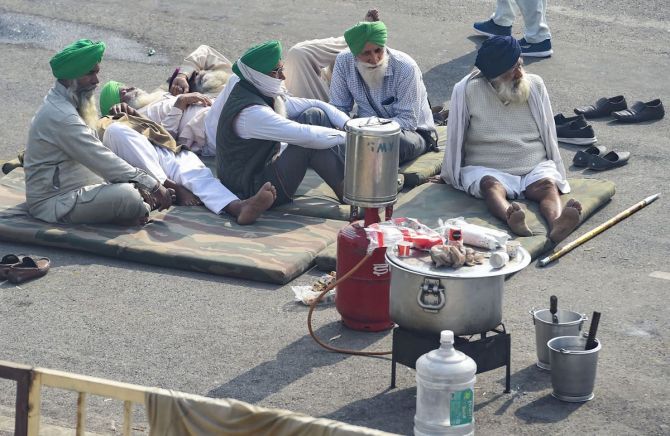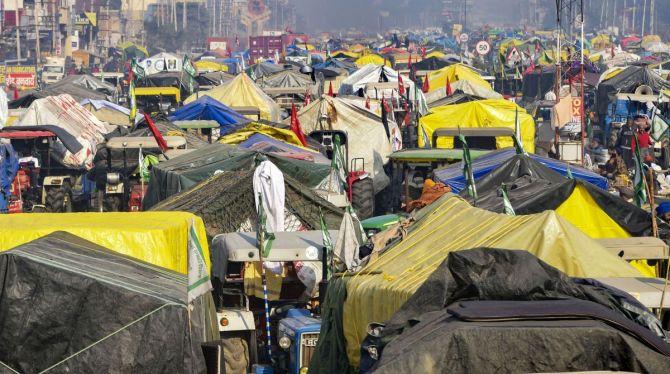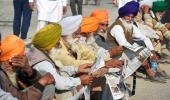'This is going to be our home in the near future as it is going to be a long fight. We are here to stay'

Tents pitched on tractors, people busy chopping vegetables to get food ready, solar panels to charge mobile phones, medical camps and even hookahs -- once a thoroughfare teeming with traffic, Delhi's Tikri border resembles a pind (village) now.
Living in this village are farmers who have come largely from neighbouring Punjab to demand a repeal of the Centre's three agriculture reform laws.
"This is going to be our home in the near future as it is going to be a long fight. We are here to stay," says 50-year-old Gurunam Singh who came from Punjab's Mansa district.
"We have plenty of everything here. We have enough provisions for at least six months," he said.
Since they landed at the Delhi gateway nine days ago, these farmers have been preparing 'langar' every day to feed over 5,000 people, including locals and those who visit the protest site.
Doctors have set up medical camps to tend to farmers who have been braving the winter chill to keep their protest going.

The threat of coronavirus also looms in a place where few wear face masks or maintain social distancing.
However, this doesn't deter the protesters.
Gurunam, who set out from home on November 26, complained of chest pain soon after he arrived at Tikri border and was referred to Ram Manohar Lohia Hospital in New Delhi.
After he was discharged from the hospital, he chose to stay back with other protesters.
"We are from Punjab, we spread love wherever we go. Neither coronavirus nor winter can stop us from fighting our battle," said Gurunam.

Resting on his tractor, Ram Singh, also from Mansa, said he and his elderly uncle won't go back until the farm laws are repealed.
Ram said they have full support from their village and at least one person from each family has joined the protest here.
Over 500 tractors are lined up along the road, one after the other.
Many have posters tied on with messages like "No farmer, no food, no GDP, no future".

These posters are made by a group of farmers, mostly youngsters.
Honey, a second-year BA student who discontinued his online classes to join the protest, is busy making one such poster.
It reads: "We are farmers, not terrorists".
"I am a farmer's son. If today I don't fight for the farming community's rights, what is the point of such an education?" he asks.

Some good samaritans have set up solar panels at the protest site so that the farmers can charge their mobile phones, while many local groups are providing things like water, soap, dry fruits and mosquito repellents.
Temporary toilets have also been set up at Tikri border.
Acknowledging the support, the farmers said people have not just opened their doors to them but also their hearts.
Sandeep Sharma, who runs a small workshop in the area, has laid out pipes to ensure farmers have enough water for daily chores like bathing and washing clothes.

"These farmers are our guests. They are our backbone," Sharma said.
"They produce food for us. We would consider ourselves fortunate if we are able to help them today," he said.
"Within a week, we have developed a close relationship with them. When they have breakfast or lunch, they insist we join them," he added.
Krishnan, who supplies medical oxygen, has extended an electricity connection via his shop to the farmers for charging their mobile phones.

Enacted in September, the three farm laws are anticipated to bring "reforms" in the agriculture sector by removing middlemen and allowing farmers to sell their produce anywhere in the country.
Farmers worry these laws will eliminate the safety net of the Minimum Support Price and do away with mandis that ensure earning. But the government says the MSP system will continue and the new laws will give farmers more options to sell their crop.
The farmers have called for a 'Bharat Bandh' on December 8 and threatened to occupy toll plazas.










